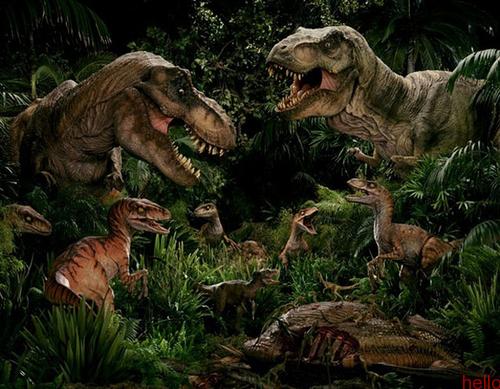In the Cretaceous Period, plant eaters faced vicious killers.
在白堊紀(jì),食草動(dòng)物們不得不面對(duì)兇殘的殺手。
And none has a worse reputation than Tyrannosaurus Rex, possibly the largest land predator that has ever lived.
這其中沒有比霸王龍更臭名昭著的了,它可能是迄今為止最大的陸生食肉動(dòng)物。
T. Rex is sort of the quintessential monster. A dinosaur with an attitude.
某種程度上說霸王龍是最完美的怪獸。充滿敵意的恐龍。
A Tyrannosaurus Rex can grow to five 5.5 meters tall and 12 meters long, with jaws designed to tear meat to shreds.
霸王龍可以長(zhǎng)到5.5米高,12米長(zhǎng),它們的下顎天生就是用來撕碎血肉的。
It's reputation for violence and terror is unmatched.
它那狂暴和恐怖的名聲無人能及。

But a infant T. Rex comes into the world better protected than most.
但是霸王龍的幼崽在出生后會(huì)受到比多數(shù)幼崽更好的保護(hù)。
If you say "Tyrannosaurus Rex", I think of gentleness.
如果你提起"霸王龍",我會(huì)想到溫柔。
I think of superb motherhood and a struggle to raise one's chicks.
我會(huì)想到偉大的母性和養(yǎng)育幼崽的艱辛。
The dreaded Tyrannosaurus Rex, it turns out, is one of the most nurturing of all dinosaur parents.
令人恐懼的霸王龍卻是恐龍家庭中最擅長(zhǎng)育雛的家長(zhǎng)。
It means taking care of the eggs, sticking around the nest, defending the nest, and keeping track of its progress.
這意味著對(duì)蛋的細(xì)心照料,在巢穴附近徘徊守護(hù)巢穴,時(shí)刻關(guān)注蛋的動(dòng)向。
Tyrannosaurus rex means "tyrant lizard king."
霸王龍的意思是"蜥蜴暴君"。
And this beast rules a world where physical traits more than intelligence determine winners and losers.
它統(tǒng)治著這個(gè)身體特征比智力因素更能決定成王敗寇的世界。
But T. Rex has both-- superb biomechanics and, by dinosaur standards, a sharp intellect.
但霸王龍兩者兼得,完美的生理結(jié)構(gòu),還有相對(duì)恐龍標(biāo)準(zhǔn)來說的敏銳思維。
It was the result of many, many millions of years of specialization for large body size, for focus on prey, for sensory apparatus, and for the ability to dispatch a large herbivore.
這是數(shù)百萬年特化的結(jié)果,才有了它的龐大身軀,執(zhí)著捕食,感覺器官,還有殺死大型食草動(dòng)物的能力。
With things like Tyrannosaurus Rex, you have bigger brains, you have the option for more complex behaviors, especially when it comes to parental care.
對(duì)于霸王龍,它們擁有更大的大腦,可以選擇更加復(fù)雜的行為,尤其是親代育雛方面。
For three months, an adult delicately guards the nest to ensure the survival of their youngsters and the continuation of their genes.
在三個(gè)月時(shí)間里,成年霸王龍都會(huì)悉心保護(hù)巢穴以確保幼崽的存活和基因的延續(xù)。
You've got to have somebody that's very, very attentive when these little things hatch.
當(dāng)這些小家伙孵化時(shí)必須確保時(shí)時(shí)刻刻有人關(guān)注。
Inside the egg, the embryo breathes in oxygen and exhales carbon dioxide.
在蛋的內(nèi)部胚胎吸入氧氣,呼出二氧化碳。
The CO2 dissolves in fluid, making carbonic acid, which will slowly weakens the shell.
二氧化碳溶解于胚胎組織液中,形成碳酸會(huì)慢慢腐蝕蛋殼。
Before long, a meter long T. Rex chick breaks free.
沒過多久,一米長(zhǎng)的霸王龍幼崽破殼而出了。
You can imagine T. Rex helping its young out of the shell, even with those big, giant jaws.
你可以想象霸王龍幫助幼崽破殼而出的場(chǎng)景,即使用它那巨大的下顎。
The hatchling is tiny compared to its gigantic parents.
剛孵出的幼崽與龐大的父母相比是如此瘦小。
And it's immediately under threat.
它們很快就被威脅縈繞左右。


